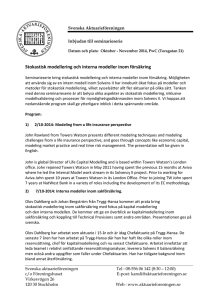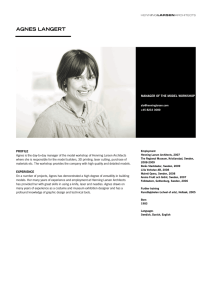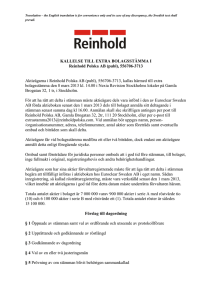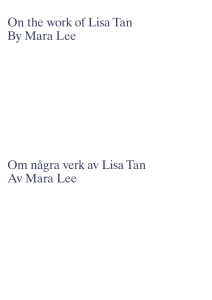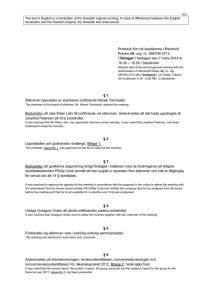slides - Statistical Machine Translation
advertisement
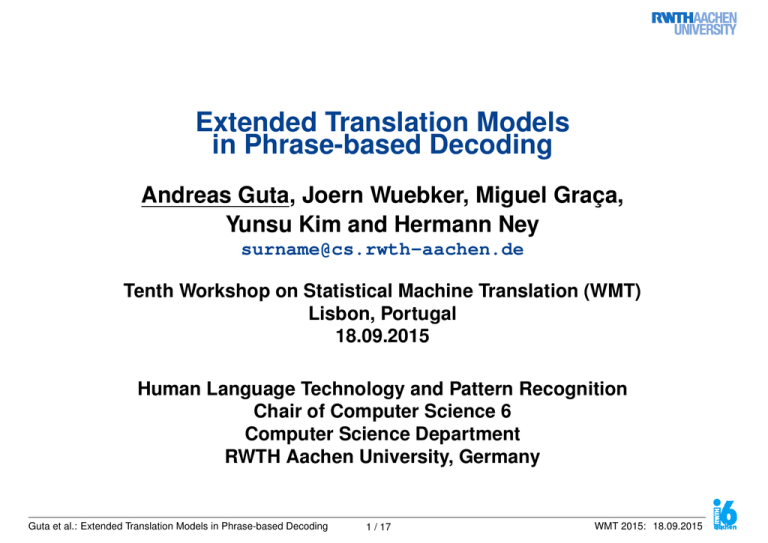
Extended Translation Models
in Phrase-based Decoding
Andreas Guta, Joern Wuebker, Miguel Graça,
Yunsu Kim and Hermann Ney
surname@cs.rwth-aachen.de
Tenth Workshop on Statistical Machine Translation (WMT)
Lisbon, Portugal
18.09.2015
Human Language Technology and Pattern Recognition
Chair of Computer Science 6
Computer Science Department
RWTH Aachen University, Germany
Guta et al.: Extended Translation Models in Phrase-based Decoding
1 / 17
WMT 2015: 18.09.2015
Introduction
Phrase-based translation models
[Och & Tillmann+ 99, Zens & Och+ 02, Koehn & Och+ 03]
I phrases extracted from alignments obtained using GIZA++ [Och & Ney 03]
I estimation as relative frequencies of phrase pairs
I drawbacks:
. single-word phrases translated without any context
. uncaptured dependencies beyond phrase boundaries
. difficulties with long-range reorderings
Guta et al.: Extended Translation Models in Phrase-based Decoding
2 / 17
WMT 2015: 18.09.2015
Related Work
I bilingual language models [Niehues & Herrmann+ 11]
. atomic source phrases, no reordering context
I reordering model based on sequence labeling [Feng & Peter+ 13]
. modeling only reorderings
I operation sequence model (OSM) [Durrani & Fraser+ 13]
. n-gram model based on minimal translation units
I neural network models for extended translation context
. rescoring [Le & Allauzen+ 12, Sundermeyer & Alkhouli+ 14]
. decoding [Devlin & Zbib+ 14, Auli & Gao 14, Alkhouli & Rietig+ 15]
. stand-alone models [Sutskever & Vinyals+ 14, Bahdanau & Cho+ 15]
I joint translation and reordering models [Guta & Alkhouli+ 15]
. word-based and simpler reordering approach than OSM
. count models and neural networks (NNs)
Guta et al.: Extended Translation Models in Phrase-based Decoding
3 / 17
WMT 2015: 18.09.2015
This Work
I develop two variants of extended translation models (ETM)
. extend IBM models by a bilingual word pair and a reordering operation
. integrated into log-linear framework of phrase-based decoding
. explicit treatment of multiple alignments and unaligned words
I benefits:
. lexical and reordering context for single-word phrases
. dependencies across phrase boundaries
. long-range source dependencies
I first step: implementation as smoothed count models
I the long-term goal:
. application as stand-alone models in decoding
. retraining the word alignments
Guta et al.: Extended Translation Models in Phrase-based Decoding
4 / 17
WMT 2015: 18.09.2015
Extended Translation Models
I source sentence f1J = f1 . . . fj . . . fJ
I target sentence eI1 = e1 . . . ei . . . eI
I inverted alignment bI1 with bi ⊆ {1 . . . J }
. unaligned source positions b0
I empty words f0, e0
Guta et al.: Extended Translation Models in Phrase-based Decoding
5 / 17
WMT 2015: 18.09.2015
Jump Classes
I generalizing alignments to
. jump classes for source positions aligned to subsequent target positions
insert (↓)
stay (•)
forward (→)
jump forward (y)
backward (←)
jump backward (x)
. jump classes source positions aligned to the same target position
forward (→)
Guta et al.: Extended Translation Models in Phrase-based Decoding
jump forward (y)
6 / 17
WMT 2015: 18.09.2015
Extended Inverse Translation Model (EiTM)
I EiTM models the inverse probability p(f1J |eI1 )
Y
I p(f1J |eI1 ) = max
p(fbi |ei0 , ei, fbi0 , bi0 , bi) · p(bi|ei0 , ei, fbi0 , bi0 ) · p(fb0 |e0)
| {z }
I
|
{z
} |
{z
}
b1
i=1
lexicon model
alignment model
deletion model
I current source words fbi and target word ei
I previous source words fbi0 and target word ei0
I generalize aligments bi0 , bi to jump classes
I multiple source predecessors j 0 in bi0 or bi
. average probabilities over all j 0
Guta et al.: Extended Translation Models in Phrase-based Decoding
7 / 17
WMT 2015: 18.09.2015
EiTM Example
Guta et al.: Extended Translation Models in Phrase-based Decoding
8 / 17
WMT 2015: 18.09.2015
Extended Direct Translation Model (EdTM)
I further aim: model p(eI1 |f1J ) as well
I first approach by using the EiTM:
. swap source and target corpora
. invert also the alignment
I drawback:
. source words not translated in monotone order
. source word preceding a phrase might have not been translated yet
. its last aligned predecessor and corresponding aligned target words generally unknown
I dependencies beyond phrase boundaries cannot be captured
I develop the EdTM
. swap source and target corpora, but keep bI1
. incorporate dependencies beyond phrase boundaries
Guta et al.: Extended Translation Models in Phrase-based Decoding
9 / 17
WMT 2015: 18.09.2015
Extended Direct Translation Model (EdTM)
I EdTM models the direct probability p(eI1 |f1J )
Y
I p(eI1 |f1J ) = max
p(ei|fbi0 , fbi , ei0 , bi0 , bi) · p(bi|fbi0 , fbi , ei0 , bi0 ) · p(e0|fb0 )
| {z }
I
|
{z
} |
{z
}
b1
i=1
lexicon model
alignment model
deletion model
I differences to EiTM
. lexicon model: swapped ei and fbi
. alignment model: dependence on fbi (instead of ei)
. deletion model: swapped e0 and fb0
Guta et al.: Extended Translation Models in Phrase-based Decoding
10 / 17
WMT 2015: 18.09.2015
Count Models and Smoothing
How to train the derived EdTM and EiTM models?
I estimate Viterbi alignment using GIZA++ [Och & Ney 03]
I compute relative frequencies
I apply interpolated Kneser-Ney smoothing [Chen & Goodman 98]
Guta et al.: Extended Translation Models in Phrase-based Decoding
11 / 17
WMT 2015: 18.09.2015
Integration into Phrase-based Decoding
I phrase-based decoder Jane 2 [Wuebker & Huck+ 12]
I log-linear model combination [Och & Ney 04]
. tuning with minimum error rate training (MERT) [Och 03]
I annotation of phrase-table entries with word alignments
I extended translation models integrated as up to 4 additional features:
. EdTM and EiTM
. Source→Target and Target→Source
I search state extension:
. store the source position aligned to the last translated target word
I context beyond phrase boundaries only in Source→Target direction
Guta et al.: Extended Translation Models in Phrase-based Decoding
12 / 17
WMT 2015: 18.09.2015
Experimental Setups
IWSLT
IWSLT
BOLT
BOLT
German English English French Chinese English Arabic English
Sentences
full data
indomain
Run. Words
Vocabulary
4.32M
138K
108M
109M
836K
792K
26.05M
185K
698M
810M
2119K 2139K
4.08M
67.8K
78M
86M
384K
817K
0.92M
0.92M
14M
16M
285K
203K
I phrase-based systems
. phrasal and lexical models (both directions)
. word and phrase penalties
. distortion model
. 4- / 5-gram language model (LM)
. 7-gram word class LM [Wuebker & Peitz+ 13]
. hierarchical reordering model (HRM) [Galley & Manning 08]
Guta et al.: Extended Translation Models in Phrase-based Decoding
13 / 17
WMT 2015: 18.09.2015
Results: IWSLT 2014 German→English
test2010
B LEU [%] T ER [%]
phrase-based system + HRM
30.7
49.3
+ EiTM (Source↔Target)
31.4
48.3
+ EdTM (Source↔Target)
31.6
48.1
+ EiTM (Source→Target) + EdTM (Source→Target)
31.6
48.2
+ EiTM (Source↔Target) + EdTM (Source↔Target)
31.8
48.2
Guta et al.: Extended Translation Models in Phrase-based Decoding
14 / 17
WMT 2015: 18.09.2015
Results: Comparison to OSM
I all results measured in B LEU [%]
IWSLT
BOLT
De→En En→Fr Zh→En Ar→En
phrase-based system + HRM
30.7
33.1
17.0
24.0
+ ETM
31.8
33.9
17.5
24.4
+ 7-gram OSM
31.8
34.5
17.6
24.1
Guta et al.: Extended Translation Models in Phrase-based Decoding
15 / 17
WMT 2015: 18.09.2015
Conclusion
I integration of extended translation models into phrase-based decoding
. lexical and reordering context beyond phrase boundaries
. multiple and empty alignments
. relative frequencies with interpolated Kneser-Ney smoothing
I improving phrase-based systems including HRM
. by up to 1.1% B LEU and T ER
. by 0.7% B LEU on average for four large-scale tasks
I competitive to a 7-gram OSM
. 0.1% B LEU less improvement on average on top of phrase-based systems
including the HRM
I long-term goals:
. retraining the alignments: joint optimization
. stand-alone decoding without phrases
Guta et al.: Extended Translation Models in Phrase-based Decoding
16 / 17
WMT 2015: 18.09.2015
Thank you for your attention
Andreas Guta
surname@cs.rwth-aachen.de
http://www-i6.informatik.rwth-aachen.de/
Guta et al.: Extended Translation Models in Phrase-based Decoding
17 / 17
WMT 2015: 18.09.2015
References
[Alkhouli & Rietig+ 15] T. Alkhouli, F. Rietig, H. Ney: Investigations on Phrasebased Decoding with Recurrent Neural Network Language and Translation
Models. In Proceedings of the EMNLP 2015 Tenth Workshop on Statistical
Machine Translation, pp. 294–303, Lisbon, Portugal, Sept. 2015. 3
[Auli & Gao 14] M. Auli, J. Gao: Decoder Integration and Expected BLEU Training for Recurrent Neural Network Language Models. In Annual Meeting of the
Association for Computational Linguistics, pp. 136–142, Baltimore, MD, USA,
June 2014. 3
[Bahdanau & Cho+ 15] D. Bahdanau, K. Cho, Y. Bengio: Neural Machine Translation by Jointly Learning to Align and Translate. In International Conference
on Learning Representations, San Diego, Calefornia, USA, May 2015. 3
[Chen & Goodman 98] S.F. Chen, J. Goodman: An Empirical Study of Smoothing Techniques for Language Modeling. Technical Report TR-10-98, Computer
Science Group, Harvard University, Cambridge, MA, 63 pages, Aug. 1998. 11
[Devlin & Zbib+ 14] J. Devlin, R. Zbib, Z. Huang, T. Lamar, R. Schwartz,
J. Makhoul: Fast and Robust Neural Network Joint Models for Statistical MaGuta et al.: Extended Translation Models in Phrase-based Decoding
18 / 17
WMT 2015: 18.09.2015
chine Translation. In 52nd Annual Meeting of the Association for Computational Linguistics, pp. 1370–1380, Baltimore, MD, USA, June 2014. 3
[Durrani & Fraser+ 13] N. Durrani, A. Fraser, H. Schmid, H. Hoang, P. Koehn:
Can Markov Models Over Minimal Translation Units Help Phrase-Based SMT?
In Proceedings of the 51st Annual Meeting of the Association for Computational Linguistics (Volume 2: Short Papers), pp. 399–405, Sofia, Bulgaria, August 2013. 3
[Feng & Peter+ 13] M. Feng, J.T. Peter, H. Ney: Advancements in Reordering
Models for Statistical Machine Translation. In Annual Meeting of the Assoc.
for Computational Linguistics, pp. 322–332, Sofia, Bulgaria, Aug. 2013. 3
[Galley & Manning 08] M. Galley, C.D. Manning: A simple and effective hierarchical phrase reordering model. In Proceedings of the Conference on Empirical
Methods in Natural Language Processing, EMNLP ’08, pp. 848–856, Stroudsburg, PA, USA, 2008. Association for Computational Linguistics. 13
[Guta & Alkhouli+ 15] A. Guta, T. Alkhouli, J.T. Peter, J. Wuebker, H. Ney: A Comparison between Count and Neural Network Models Based on Joint Translation and Reordering Sequences. In Proceedings of the 2015 Conference on
Empirical Methods in Natural Language Processing, pp. 1401–1411, Lisbon,
Portugal, Sept. 2015. Association for Computational Linguistics. 3
Guta et al.: Extended Translation Models in Phrase-based Decoding
19 / 17
WMT 2015: 18.09.2015
[Koehn & Och+ 03] P. Koehn, F.J. Och, D. Marcu: Statistical Phrase-Based
Translation. In Proceedings of the 2003 Meeting of the North American chapter of the Association for Computational Linguistics (NAACL-03), pp. 127–133,
Edmonton, Alberta, 2003. 2
[Le & Allauzen+ 12] H.S. Le, A. Allauzen, F. Yvon: Continuous Space Translation Models with Neural Networks. In Conference of the North American
Chapter of the Association for Computational Linguistics: Human Language
Technologies, pp. 39–48, Montreal, Canada, June 2012. 3
[Niehues & Herrmann+ 11] J. Niehues, T. Herrmann, S. Vogel, A. Waibel: Proceedings of the Sixth Workshop on Statistical Machine Translation, chapter
Wider Context by Using Bilingual Language Models in Machine Translation,
pp. 198–206. 2011. 3
[Och 03] F.J. Och: Minimum Error Rate Training in Statistical Machine Translation. In Proc. of the 41th Annual Meeting of the Association for Computational
Linguistics (ACL), pp. 160–167, Sapporo, Japan, July 2003. 12
[Och & Ney 03] F.J. Och, H. Ney: A Systematic Comparison of Various Statistical
Alignment Models. Computational Linguistics, Vol. 29, No. 1, pp. 19–51, March
2003. 2, 11
Guta et al.: Extended Translation Models in Phrase-based Decoding
20 / 17
WMT 2015: 18.09.2015
[Och & Ney 04] F.J. Och, H. Ney: The Alignment Template Approach to Statistical Machine Translation. Computational Linguistics, Vol. 30, No. 4, pp. 417–
449, Dec. 2004. 12
[Och & Tillmann+ 99] F.J. Och, C. Tillmann, H. Ney: Improved Alignment Models
for Statistical Machine Translation. In Proc. Joint SIGDAT Conf. on Empirical
Methods in Natural Language Processing and Very Large Corpora, pp. 20–28,
University of Maryland, College Park, MD, June 1999. 2
[Sundermeyer & Alkhouli+ 14] M. Sundermeyer, T. Alkhouli, J. Wuebker, H. Ney:
Translation Modeling with Bidirectional Recurrent Neural Networks. In Conference on Empirical Methods on Natural Language Processing, pp. 14–25,
Doha, Qatar, Oct. 2014. 3
[Sutskever & Vinyals+ 14] I. Sutskever, O. Vinyals, Q.V.V. Le: Sequence to Sequence Learning with Neural Networks. In Advances in Neural Information
Processing Systems 27, pp. 3104–3112, 2014. 3
[Wuebker & Huck+ 12] J. Wuebker, M. Huck, S. Peitz, M. Nuhn, M. Freitag, J.T. Peter, S. Mansour, H. Ney: Jane 2: Open Source Phrase-based and Hierarchical
Statistical Machine Translation. In International Conference on Computational
Linguistics, pp. 483–491, Mumbai, India, Dec. 2012. 12
Guta et al.: Extended Translation Models in Phrase-based Decoding
21 / 17
WMT 2015: 18.09.2015
[Wuebker & Peitz+ 13] J. Wuebker, S. Peitz, F. Rietig, H. Ney: Improving Statistical Machine Translation with Word Class Models. In Conference on Empirical
Methods in Natural Language Processing, pp. 1377–1381, Seattle, USA, Oct.
2013. 13
[Zens & Och+ 02] R. Zens, F.J. Och, H. Ney: Phrase-Based Statistical Machine
Translation. In 25th German Conf. on Artificial Intelligence (KI2002), pp. 18–32,
Aachen, Germany, Sept. 2002. 2
Guta et al.: Extended Translation Models in Phrase-based Decoding
22 / 17
WMT 2015: 18.09.2015
